By Karmen Long, Tzu Chi International Medical Association
Translated by Wu Hsiao-ting
Photos by Cai Kai-fan
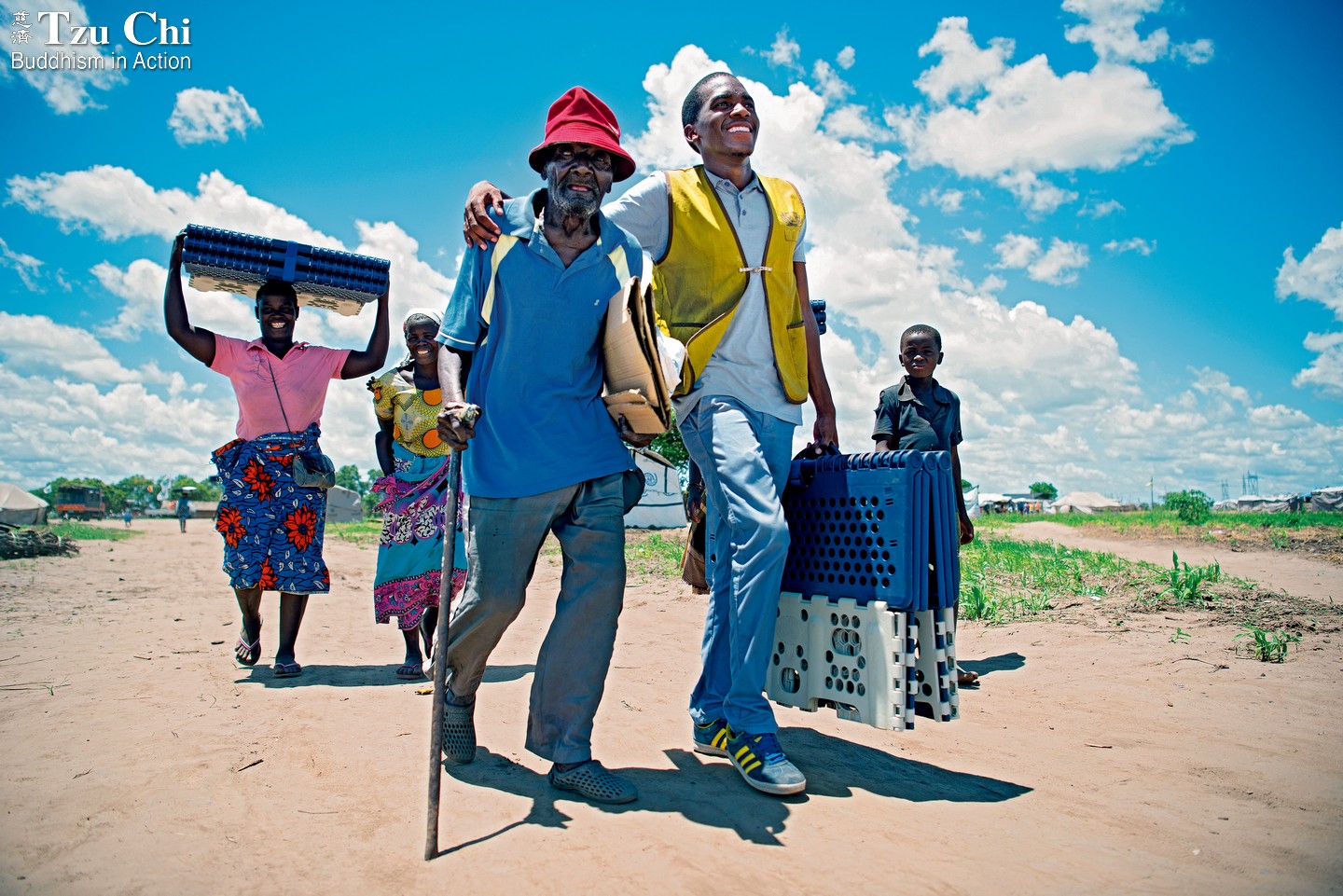
A volunteer carries a folding bed home for an elderly villager. Tzu Chi held distributions of folding beds in Nedja and Metichura in the village of Tica, Sofala Province, in December 2019.
Nine months after Cyclone Idai hit Mozambique in mid-March 2019, I visited the country again. I found a Mozambique that was at once familiar and strange to me.
It was strange to me because the scenes of devastation left behind by the cyclone were gone. In Biera, the capital and largest city of Sofala Province, in central Mozambique, the utility poles and streetlights toppled by the storm had been put back in place; the fallen trees on the roadside had been cleared away; and the depressions and holes on the main thoroughfares had been filled in. National Road No. 6, which led to Nhamatanda, another disaster area, was no longer packed with bumper-to-bumper traffic. I had already noticed on my flight over that the airplane wasn’t packed with international disaster relief workers as it was last time, but even the airport was quiet, no longer full of people and the bustle of activity.
Though everything seemed to have settled back to normal in Beira, evidence of the cyclone remained if you looked close enough. Many houses along the larger roads were still covered with plastic tarps, serving as temporary roofs. The surfaces of many side roads were still damaged and potholed in many places. As our vehicle took us farther and farther away from the airport, we noticed the road on which we were traveling turning into bumpy dirt road. Traveling deeper into local villages, we saw many people still living in tents. Grown men were loitering aimlessly around. No work for them meant no income. This was the Mozambique that was familiar to me.
Even more familiar to me were the local Tzu Chi volunteers. After Cyclone Idai, Tzu Chi had enlisted the help of local young people to implement its emergency relief work. Those young volunteers were still there in the disaster areas. Seeing them singing and dancing, I realized that I had really returned to Mozambique.
The gift of beds
Tzu Chi initiated its relief operations in the immediate aftermath of Cyclone Idai. Our foundation distributed food, seeds, farming utensils, building materials, and tools. We later provided free medical clinics. The initial phase of emergency aid work has since been followed by mid- and long-term reconstruction projects, including houses and schools. Because our volunteers have continued to work in the disaster areas, Tzu Chi has been able to offer to the survivors help and services that have truly met their needs.
Along with some local volunteers, I visited some survivors in their tents. The first thing we noticed as we stepped inside was how hot the tents were. The residents told us that they usually didn’t spend time indoors during the ten hours between sunrise and sunset. During the day, they sought shady areas outside to try to stay cool.
Some in our group took off their shoes to feel the temperature of the ground. They found that it was so hot it was impossible to lie on it. That’s when we decided to distribute Tzu Chi folding beds to residents. Since the beds could fold up and double as chairs, residents would find them handy. They could use the multi-function beds inside or outside of a tent.
Distributions were held soon afterwards in Nedja and Metichura, in the village of Tica. These areas were also the proposed sites for houses the foundation was building for survivors. After receiving their beds, recipients hoisted the gifts from Tzu Chi onto their heads and headed home. Some, upon returning home, immediately unfolded their beds in the shade of trees and lay down on them to rest. A woman called out to us as we passed her home, “We can finally get a good sleep tonight!” Hearing the gratitude in the woman’s voice, I knew that the work of our volunteers in Mozambique had made a real difference to the people here.
Many of our volunteers in Mozambique have difficulty themselves making a living, but that didn’t stop them from volunteering. They even invited their fellow villagers to join them in their work. Francisco was an example. When we visited him at his home, he proudly told us that he had enlisted 50 volunteers in the past several months.
We asked him why he had recruited so many volunteers. He replied, “I’ll take them to visit the needy in our community, to care for our fellow villagers.” When he said this, I thought, “Isn’t this the ideal of community volunteerism Master Cheng Yen has been promoting—that people in the same neighborhood should help each other and together foster harmony in their community?”
Even though the native volunteers in Mozambique don’t understand Mandarin, are thousands of miles away from Taiwan, and have never met Master Cheng Yen, I’ve repeatedly seen them exemplify the Master’s teachings. It is as if they have appeared, like one bodhisattva after another, to help the Master care for the needy in a land that has seen much suffering.
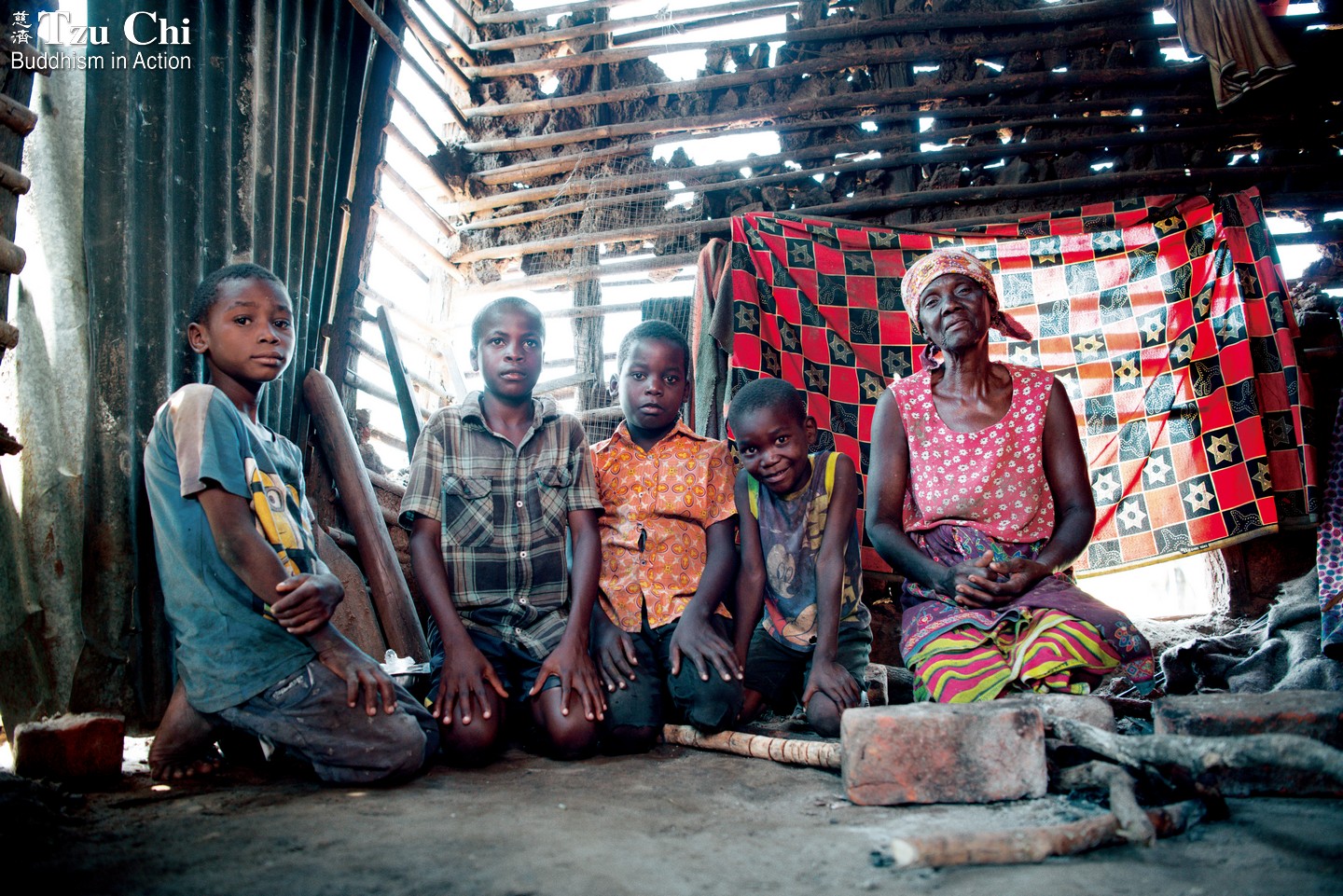
An older woman and her grandchildren in their home in Tica. When Tzu Chi volunteers visited the family, the woman said that they were using the shovel they had received from Tzu Chi for farming.
Cheia and Canna
Francisco’s daughter was born just as Cyclone Idai was slamming the country. Francisco’s pregnant wife, Lucia, had climbed a tree to escape the floods brought by the cyclone, and right up there in the tree, she gave birth to her baby girl. To commemorate this incident, Francisco named his daughter “Cheia,” meaning “flood” in Portuguese, the national language of Mozambique. Cheia was nine months old when we visited the family. She could already sit steadily on her own and had even begun crawling. We couldn’t help but praise life’s resilience when we saw her.
We met another baby girl, Canna Fernando, in Metichura. Canna was born on the evening of July 13, 2019. Earlier that day, her mother, Dominga Manuel, had gone to a Tzu Chi distribution and received some instant rice. After she had returned home and eaten a meal, she gave birth to a baby girl. Her gratitude to Tzu Chi for the food they had given her had led her to name her baby girl “Canna,” which sounds like “gratitude” in Mandarin.
When Tzu Chi was distributing folding beds to cyclone victims in Metichura, Dominga, looking at a picture of Master Cheng Yen at the venue, expressed again her appreciation for the Master’s help. She thanked the Master for giving her family food so that she and her six children wouldn’t have to starve. By this time, Canna was six months old, and she looked lovely and healthy.
As Cheia grew, the emergency period following the cyclone came to an end. By the time Canna was born, survivors were well on their way to recovery. The local people had never had much, and though the cyclone made their lives harder, they didn’t blame heaven or complain about their bad luck. On the contrary, they faced their lot in life philosophically. Though they started their lives over after the cycle with fortitude, behind that were lives of hardship beyond the imagination of outsiders.
At a distribution, volunteers demonstrate how to set up a Tzu Chi folding bed.
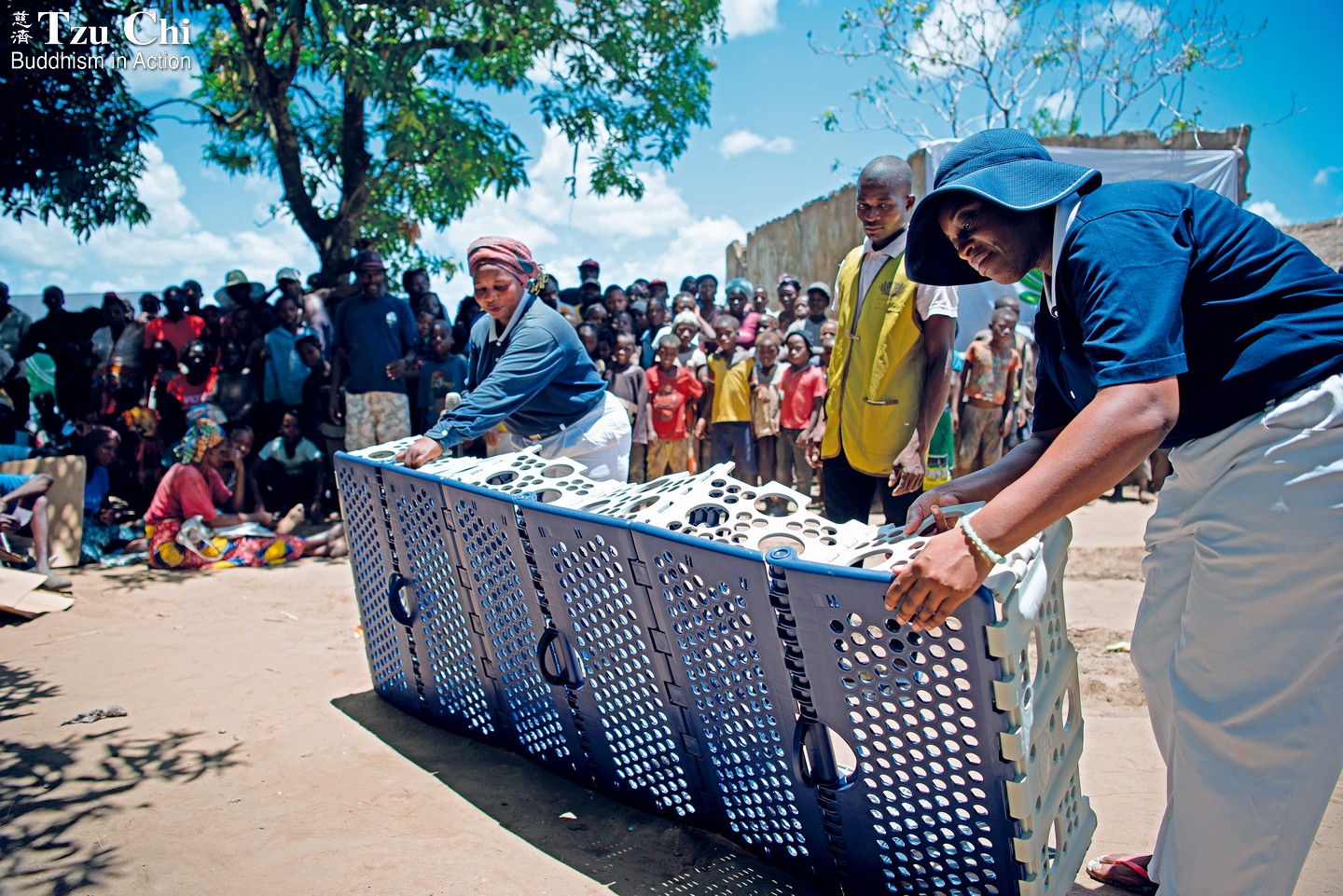
Unemployed dentists
In many countries around the world, dentists, physicians, and nurses are considered professions that guarantee security. If you apply yourself in school and obtain a related degree, you will be assured of a steady income and stable life. But this isn’t the case in Mozambique.
In May 2019, Tzu Chi held three free clinics in Sofala Province for cyclone survivors. I learned from Kenneth Liao (廖進興), a dentist from the United States who had participated in the free clinics, that several local medical professionals who volunteered at the events had been providing free medical services for years. It turned out that they hadn’t been able to land formal jobs after they had graduated from medical school, and thus were working without pay in hospitals while waiting for opportunities of paid employment. Two dentists among them had even worked pro bono for four years.
Mozambique has a population of nearly thirty million, but the doctor to patient ratio there is only three to 100,000. It isn’t that the country doesn’t need more medical professionals; it’s that there isn’t enough money to hire more doctors. Every year, the number of graduates from university medical and dentistry programs comes to about 300 each, but there are only 30 job openings offered in each category. That leaves over 500 graduates to their own devices as they face an uncertain future.
When we were distributing folding beds to cyclone survivors this time, we invited four local medical workers to help. They had volunteered in May 2019 during our free clinics. One of them, Vicente, told me he had graduated and earned his dentist’s license more than four years before, but was still waiting for the government to give him a job. He was currently serving without pay at a government hospital so that his medical skills wouldn’t grow rusty.
Because Vicente told me his story so nonchalantly, I thought he must have come from a well-to-do family and so wasn’t too worried about having to work without pay for a few years. But my impression was quite mistaken. A visit to his home allowed me to realize that the exact opposite was true.
Vicente lived in a slum a short distance from some upmarket houses in the city center of Beira. The sanitary conditions were awful, and to get to his home, we had to pass several fetid pools of standing water. It was, however, his home’s conditions that came to weigh on my mind most heavily.
Vicente was the youngest of seven children in an impoverished family. His father was already 80, and a stroke had rendered him unable to work. His mother, a seamstress, supported the family with whatever simple sewing work she could get. All of Vicente’s siblings lived out of town. His eldest sister had passed away three years before, leaving behind three children for their elderly parents to care for. This plunged the family even deeper into poverty.
When Cyclone Idai hit, their brick house was completely destroyed. The family had no choice but to move into a half-finished house belonging to Vicente’s eldest sister. The house had only half a roof, and when it rained, water fell into the house and accumulated indoors. Although he was a qualified dentist, Vicente didn’t even have the income to help repair their home.
It wasn’t that Vicente hadn’t worked hard in the hope of improving his family’s financial situation, but reality got the upper hand. In 2010, he tested into university by scoring very high on the entrance exam. With the help of a government scholarship, he began studying dentistry. “I thought that as long as I studied hard and obtained the qualifications to become a dentist,” said Vicente, “I’d be able to give my family a better life.” After he graduated, however, he not only failed to provide his family with a better life—he even became a burden to them.
Vicente said he considered himself lucky to be able to work in a hospital in Beira, even though it was without pay. A good friend and schoolmate of his, Eugenio, had not even been able to land an unpaid position in Beira. He had to go to Chimoio, a city three hours away, to work as a pro bono dentist. Unlike Vicente, Eugenio had to live separately from his family while awaiting paid employment.
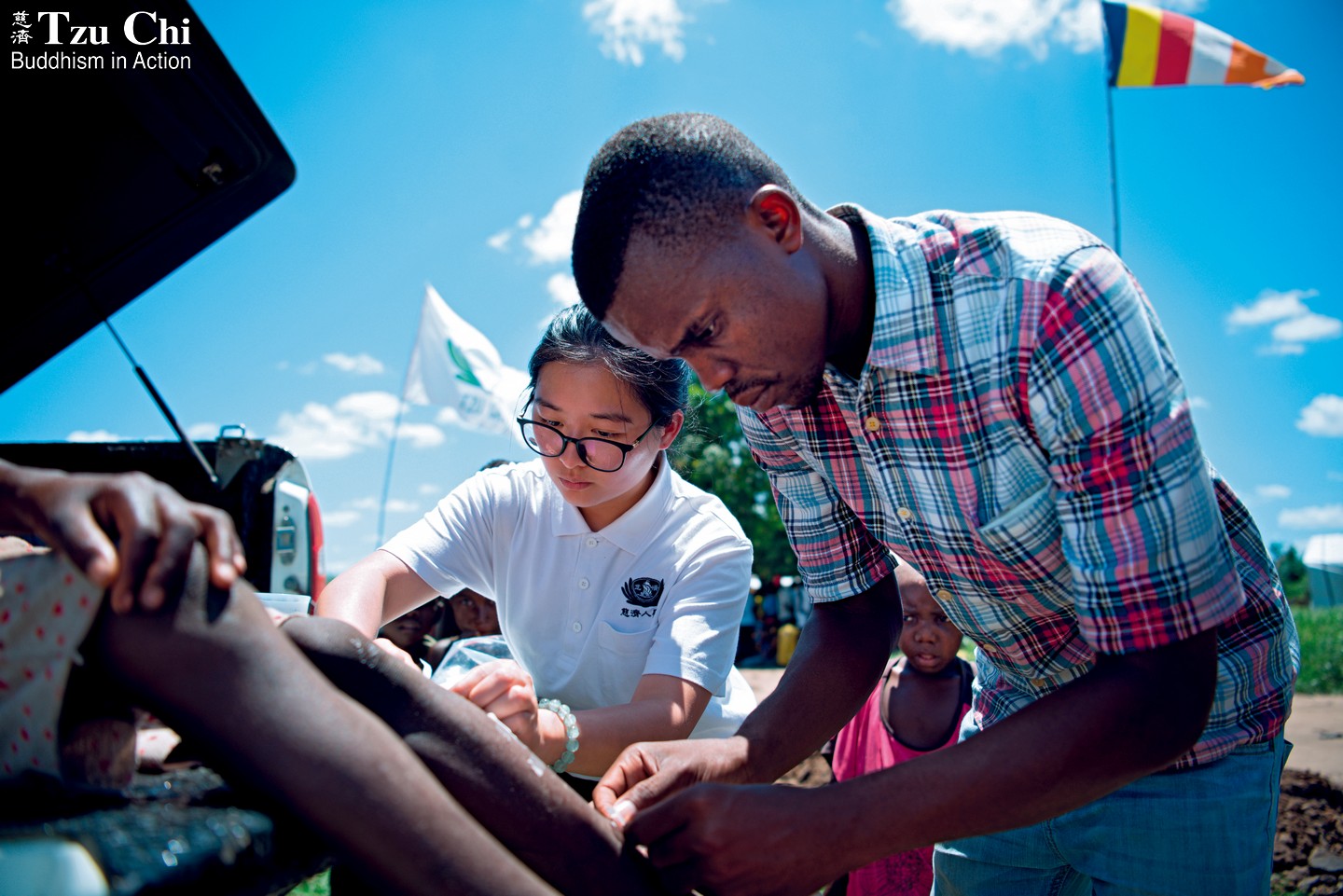
Vicente, a dentist (right), and Karmen Long (龍嘉文), a member of the Tzu Chi International Medical Association and the author of this article, tend to a villager’s lesions in Metichura.
Persevere in hardships
Like Vicente, Eugenio graduated from Zambezi University’s dentistry program. When he was young, he was badly injured in a traffic accident and was hospitalized for about a month. Though it was free to receive such treatment in a public hospital, the equipment was in bad shape and the care was inefficient. Eugenio’s parents had to run about raising money to discreetly pay off medical workers at the hospital where their son was receiving treatment in order for him to get better services. That experience made Eugenio pledge to become a physician who treated his patients as if they were his family. Though he hadn’t landed a job since his graduation and had worked without pay as a dentist for over four years, he hadn’t forgotten his aspirations.
Many qualified physicians in Mozambique have difficulty finding employment, especially dentists. Sofala Province has a population of 2,000,000, but there are only five job openings for dentists every year. The current focus of the nation’s medical system is on infectious diseases, and so funding allocated for oral hygiene has decreased. Because of this, Vicente once regretted his decision to become a dentist. That changed when he took part in the May 2019 Tzu Chi free clinics in Sofala.
During that free clinic mission, members of the Tzu Chi International Medical Association (TIMA) from countries including Taiwan, the United States, and Australia provided free medical services in Sofala. Within three days, Vicente and a Tzu Chi dentist team together served more than 600 patients. “I realized during the free clinics that what the government said about oral health being unimportant wasn’t correct. Many villagers I saw had serious dental issues. I felt that since I had the expertise in dentistry, I shouldn’t give up easily.”
That’s why, unlike many of his counterparts who had given up on medicine and switched to a different career, Vicente had stuck with his choice and kept going on his medical path.
Leonardio was also an unsalaried physician, but he had fared better than Vicente and Eugenio. He was an internist, and since internists who held paid positions in hospitals had to work night shifts, they could pay unsalaried physicians to work their night shifts for them. Though Leonardio received just 500 Mozambican metical (US$7.8) per night for standing in for a paid physician, the money was important to him because he had to support his family of four.
After listening to these young men tell their stories and after visiting their homes, I was overwhelmed with a range of emotions. I was about their age and used to practice internal medicine in Scotland. Like them, I became a medical doctor because I wanted to help others. But even though they had worked just as hard as I had in school, due to our different circumstances in life, things had gone so differently for us.
If they hadn’t insisted on holding on to their ideals and had switched to a different career path, they might already be doing a lot better financially. Their commitment must have been very firm for them to persist this far. I believed that even though things might not be going very well for them now, their perseverance would eventually pay off. The rippling effect set forth by their kindness and good intentions would eventually come back to benefit them. TIMA’s Mozambican chapter had been set up, and these doctors had decided to join. I applauded them for their decision to serve the needy despite their difficult financial situations, and I wished them the very best.
Dominga Manuel and her baby daughter, Canna Fernando, interact with Tzu Chi volunteers who were visiting their village to distribute folding beds.
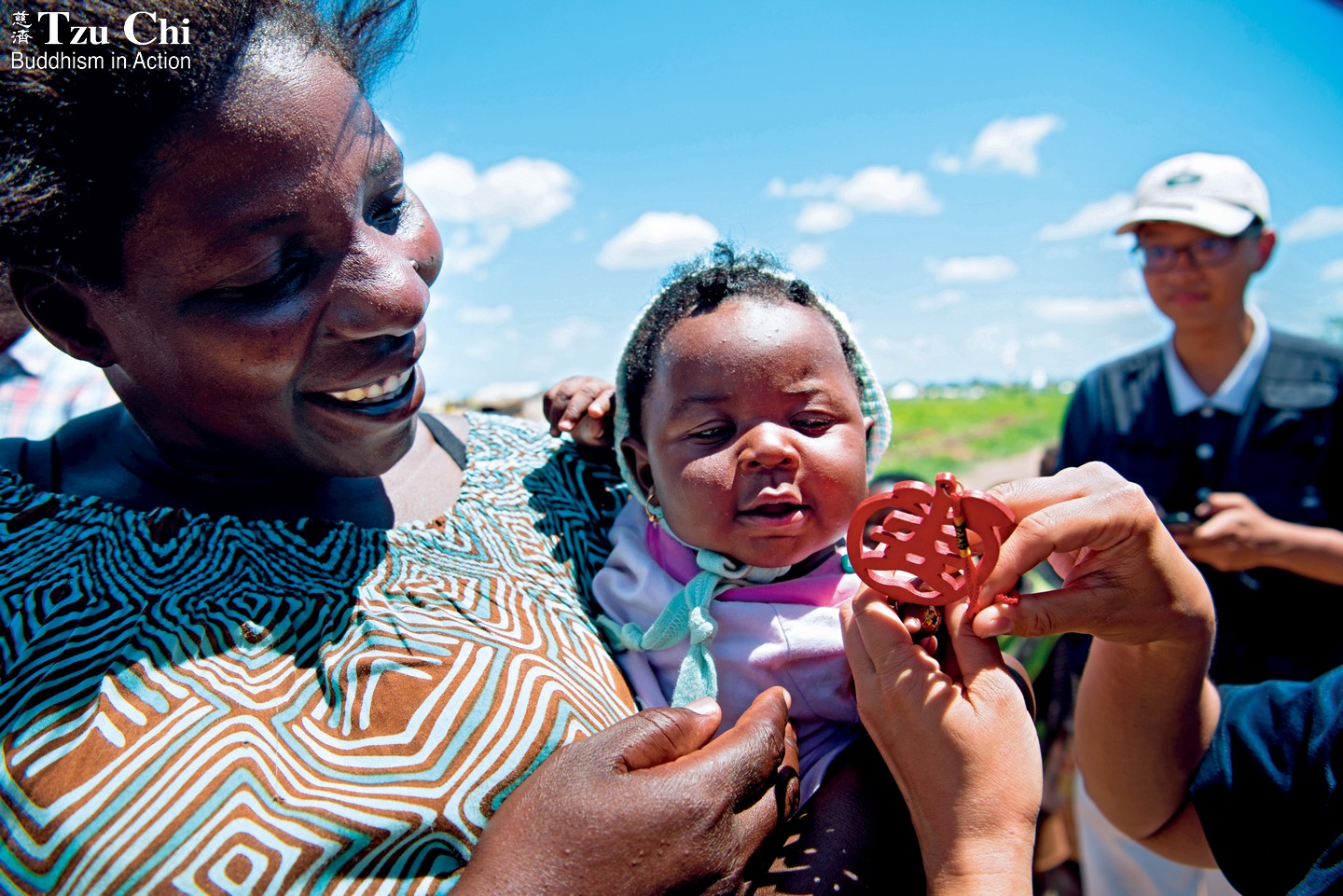
I once heard something to this effect: “Sometimes, it’s scary to take that first step. No one would blame you if you didn’t. But once you do, you will have to live with the consequences of your actions.” This reminded me of Master Cheng Yen. She founded Tzu Chi 53 years ago. She was at that time a young Buddhist nun barely able to keep herself fed. If she had just focused on her spiritual practice, no one would have blamed her. However, she took that first step and established the charity—then even decided to build a hospital to help more needy people.
I have seen in our volunteers in Mozambique that same compassion and purity of heart demonstrated by the Master half a century ago. I believe that with the help of these volunteers, the Master’s wish to transform Africa will be a dream come true.



